According to the United Nations Commission of Inquiry on Burundi, eight risk factors common to criminal atrocities and deterioration of the human rights situation exist in Burundi, a few months before the 2020 elections.
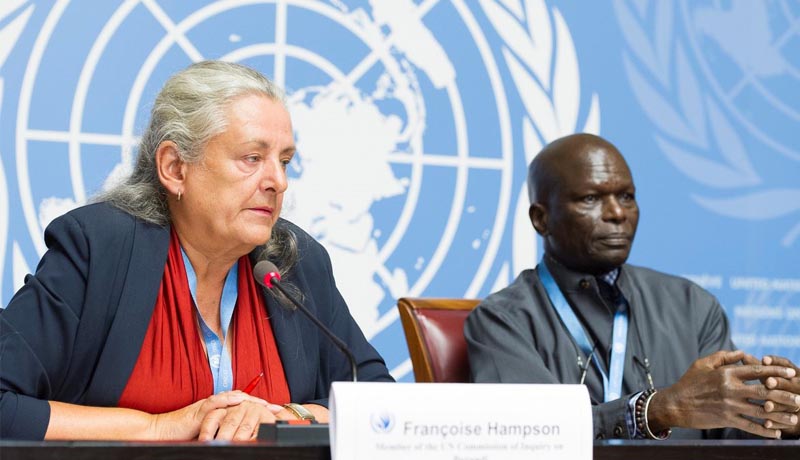
The Commission chaired by Doudou Diène alerts the international community.
At a press conference held on Wednesday, September 4, that commission chaired by Doudou Diène has alerted the international community and called for increased vigilance.
The commission gives a rather gloomy image on Burundi. Its investigation is based on 1200 testimonies including 300 dating from September 2018, a date of the renewal of the commission.
The list of violations perpetrated in the country is too long. It includes summary executions, enforced disappearances, arbitrary arrests, cases of torture and sexual violence…
The victims are for the most part the opponents (especially members of CNL party). The other people targeted are also young people accused of belonging to armed groups, returnees, journalists and human rights activists.
“The violations are now targeting the entire population inside the country, modest families with no apparent political activity in remote and rural areas. They often happen at night without witnesses,” says Doudou Diène, chairman of the commission.
The report points the finger at the Imbonerakure (ruling party youth), the police and the administration.
The judicial system is also accused. “It continued to serve as a tool of repression against opponents while promoting impunity against perpetrators”.
This is an alert on high probability of imminent criminal atrocities. “The risks are real and serious,” says Doudou Diène.
The latest report of the commission brings in some innovation. This time, the commission decides to incorporate a new concept into its work: seeing if the eight risk factors identified by the United Nations, linked to criminal atrocities, exist in Burundi. The commission thus gathered these eight factors and contextualized them with the situation in the country. The result is frosty.
Serious violations of human rights and possible crimes under international law have persisted since the beginning of the 2015 crisis. The situation is getting worse a few months before the 2020 elections.
“There are economic instability, persistence of the refugee issue, general impunity and lack of prospect of a solution to the crisis,” said Françoise Hampson, member of the Commission of Inquiry. She also mentions a narrowing of the political space and multiparty system.
Alert
“The risk factors might have allowed that some violations of human rights be avoided. Some genocides would not have occurred, “says Doudou Diène. He calls for greater vigilance on the part of the international community, the Burundian government and the population. This is an early and preventative warning.
The commission says the existence of these eight factors does not mean that criminal atrocities will occur, does not determine when, or even under which circumstances they might occur.
In response to the commission’s concerns, the Senior Adviser to the President, Willy Nyamitwe wrote on his twitter account that Burundi is no longer interested in responding to the lies and manipulation of opinion by some Westerners who only seek to destabilize Burundi .
The eight risk factors common to criminal atrocities:
1. An unstable political, economic and security environment
2. A climate of general impunity for human rights violations
3. The weakness of State structures, which negatively affects the
capacity of the State to prevent, halt or prosecute atrocity crimes.
4. The existence of reasons, aims or drives that justify the use of violence against particular groups
5. The capacity of potential perpetrators to commit atrocity crimes.
6. The lack of a strong, organized and representative national civil society as well as of a free, diverse and independent national media
7. Circumstances and a climate conducive to violence and human rights violations
8. The existence of a triggering factor: the 2020 elections.
>>Reactions
Nancy Ninette Mutoni : “CNDD-FDD denounces once again the politicization of human rights by the UN ”
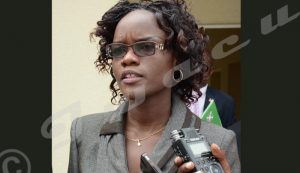 The officer in charge of communication and information within the ruling party says that CNDD-FDD party does not recognize this commission. “We cannot in any way comment on the results of its work. We imagine what fallacies it can forge against us,” says Nancy Ninette Mutoni.
The officer in charge of communication and information within the ruling party says that CNDD-FDD party does not recognize this commission. “We cannot in any way comment on the results of its work. We imagine what fallacies it can forge against us,” says Nancy Ninette Mutoni.
The ruling party denounces once again the politicization of human rights by the UN. These destabilization manoeuvres by the West have been exposed and can no longer distract Burundians in general and particularly the Bagumyabanga(members of CNDD-FDD party) and the Imbonerakure determined to take in hand the destiny of their dear nation.
Agathon Rwasa: “They are somewhat right to worry”
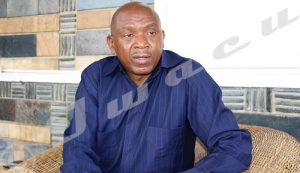 According to the President of CNL party considered as the number one victim of violence and human rights violations, the concerns of the commission are somewhat justified. According to Agathon Rwasa, the rights guaranteed by the Constitution are violated. The most recent example is the CNL party office in Nyabiraba which was set on fire. The victims were incriminated while the real culprits are still free. “This created impunity and encouraged others to do the same.” At least thirty CNL party offices have been vandalized in the country since the past few months. There are hundreds of victims of bullying and some are currently languishing in prison for political motives while others are injured. ”
According to the President of CNL party considered as the number one victim of violence and human rights violations, the concerns of the commission are somewhat justified. According to Agathon Rwasa, the rights guaranteed by the Constitution are violated. The most recent example is the CNL party office in Nyabiraba which was set on fire. The victims were incriminated while the real culprits are still free. “This created impunity and encouraged others to do the same.” At least thirty CNL party offices have been vandalized in the country since the past few months. There are hundreds of victims of bullying and some are currently languishing in prison for political motives while others are injured. ”
The good speeches of the authorities must be accompanied by actions to restore a favorable climate for the good conduct of elections.”
Analysis/ Does Doudou Diène have reason to worry?
The report of the Commission of Inquiry on Burundi comes in a context of tensions and political violence exacerbated by the preparations for the 2020 elections. In one way or another, the alert launched by this commission chaired by Doudou Diène finds its meaning in recent events marked by attacks, injuries, imprisonment and vandalism of party offices, etc.
The situation also challenged the government. The President of the Republic mandated the First Vice President of the Republic to resolve the political intolerance issue. A meeting was held on Thursday, August 29 with political party leaders and provincial governors.
All agreed that political violence is a reality. Decisions had to be made. The ruling CNDD-FDD party’s general secretary issued a recommendation to introduce a one-month ceasefire adopted by all participants.
A week later, the measure has not yet borne fruit. Some have already begun to doubt its effectiveness while others are calling on others to be optimistic. Rome was not built in a day.
In any case the barometer of the eight risk factors of the United Nations could serve even the leaders on the spot to detect when to say stop if they do not want to plunge the country into “criminal atrocities”.
Story written by Agnès Ndirubusa and translated into English by Pierre Emmanuel Ngendakumana


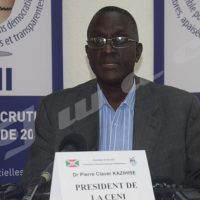
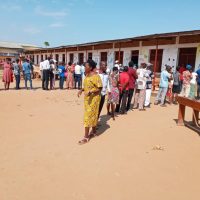
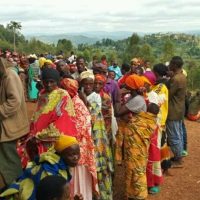
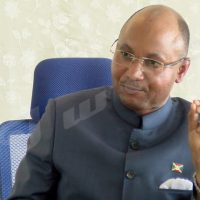













 IWACU Open Data
IWACU Open Data

